Christchurch terror attack shows why we must confront racism – Kezia Dugdale


In a powerful speech to the world, Jacinda declared that this was not New Zealand. She said: “We were not a target because we are a safe harbour for those who hate. We were not chosen for this act of violence because we condone racism, because we’re an enclave for extremism, we were chosen for the very fact that we are none of these things”.
What a wonderful antidote to rising temperatures and promises of retribution that you get from other world leaders when their values are under attack.
Advertisement
Hide AdAdvertisement
Hide AdFour days on since this act of mass murder, the focus has now moved to New Zealand’s gun laws. The perceived wisdom in the country was that, until now, they didn’t have a gun problem, so didn’t need particularly stringent gun laws. There are moves ahead to ban semi-automatic weapons, the powerful guns that let the killer do so much damage in such a short space of time.
One of the country’s big gun sellers decided to tell the world that they had sold the suspect Brenton Tarrant no less than four guns, but not the fifth, which has taken so many lives. As if that was somehow OK.
Deputy Prime Minister Winston Peters, once an opponent of stricter gun laws, is now full-square behind the change, declaring, “New Zealand has changed forever, so must our laws.”
All of this is, of course, a natural response to such an atrocity, just as banning handguns was in Scotland after Thomas Hamilton took 17 lives in Dunblane, 23 years ago to the day last Wednesday.
Advertisement
Hide AdAdvertisement
Hide AdYet legislators cannot hope that such horrific acts of violence like these will disappear following some finally crafted piece of statute. That semi-automatic gun was powered by hate and it’s the growing tolerance and promotion of hate speech that must be tackled.
You might consider it a leap that a bile-ridden tweet in one part of the world could lead to this, but I honestly believe that the internet provides intolerance with the perfect breeding conditions. Anonymity, the ability to find likeminded people wherever they are. Groupthink where communities of interest come together to reaffirm their own righteousness, emboldening their views and willingness to act upon them.
The rise of the far right is not a phenomenon unique to one country. We see it happening in the US, stoked by the occupant of the White House. We see it across Europe in democratic elections, most recently in Italy. Now we see it in the depths of the southern hemisphere at the doors of a mosque. Ironically, this extreme nationalism has little respect for borders.
Ten years after the Second World War ended, the New Zealand census showed that its citizens’ most likely place of birth after its own towns and cities was Scotland. The links between our two countries are deep and long, so we perhaps we feel this pain more than most.
Advertisement
Hide AdAdvertisement
Hide AdNevertheless, it could have happened anywhere. It could have been Annandale or Blackhall mosque, with crowds gathering in Dunedin to pay respects. Stepping up security in light of what has happened is the right and proper thing to do. However, we need to do much more to support the Muslim community in Scotland than put police officers at the gates of their place of worship. We must stamp out racism and hate in all its forms wherever we see it. We must not let it fester by saying nothing. From now on, bystanders should be considered complicit.
As I wrote this column, another atrocity was unfolding in the city of Utrecht in Holland with details yet to be confirmed. It is clear though that silence is no longer an option. We must unite and defeat prejudice and hate in all its forms to create a safer and more secure future.
